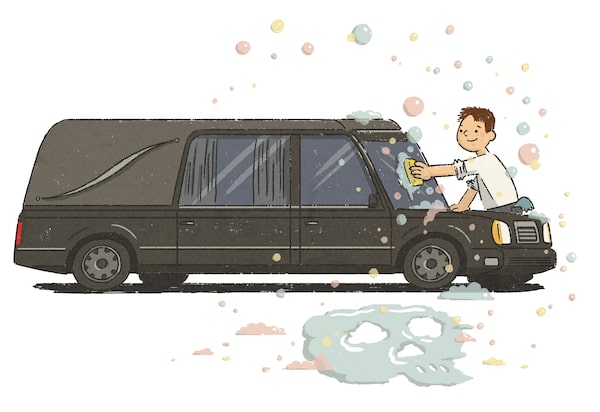First Person is a daily personal piece submitted by readers. Have a story to tell? See our guidelines at tgam.ca/essayguide.

Illustration by Catherine Chan
His broad shoulders gave the impression he was a high school principal or maybe just a well-kept accountant. Tie too big. Shoes too square. Goatee too dark for his age.
But he clearly didn’t mind. He wasn’t worried about how he looked, how he dressed or even what I thought of him. Because he was dead.
I saw my first corpse at 15. It changed how I live life and how I understand death.
While my friends mowed lawns and scrubbed dishes, I borrowed a cheap black suit from my older brother, hopped in my mom’s dented car and set off for a new, foreign land in my teenage mind: work.
I was hired as a favour to my grandmother, who had schmoozed the funeral director into hiring her deadbeat grandson while she picked out a suitable plot for her and grandpa to push up daisies from some day. Proof that in life and death – grandma knows best.
“Not now, ladies, I can’t chat” I’d say, cruising past all my high school crushes. “I’m on my way to my new summer job. That’s right! The place where they laid out your uncle after he had that coronary.”
The funeral home I worked at was family owned and operated.
It always struck me how all around the world there are generations of human beings raised in funeral homes. Babies amongst corpses. My family traditions include pot roasts and trips to the cottage. Some people grow up in a Stephen King book.
There were three brothers in charge of the home where I worked. They all looked like different evolutions of each other and had names like Larry, Terry and Gerry. The rest of the staff included a tall, gangly, Mennonite fellow, a college-graduated receptionist who modelled on the side and an elderly, Scottish woman with awful breath.
My official title was funeral usher. I was to help the funeral director with his day-to-day tasks and assist in the funeral process. I’d help attendees find their seats and make the show run as smoothly as possible. I’d also tidy the main lobby, scrub Cadillac hearses, wheel caskets from one showroom to the next and prep the stereo system, ensuring the funeral would be accompanied by the right music. Most of the time, the family of the deceased submitted a disc of the person’s favourite songs. The odd time, the deceased person had one prepared.
Now, I know you have your workout playlist, your night out playlist and maybe a cozy, autumn Sunday morning playlist. But a “songs to bury me to” playlist? That surprised me.
One of my favourite tasks was folding the funeral cards. I’d stare into the eyes of the person pictured, creating a hypothetical life story in my head for every name and face I came across. I’d conjure up how many kids they had, where they vacationed or what they did for a living before dying. Did they like pineapple on pizza?
At some of the funerals, emotions were high. The attendees couldn’t talk to or look at one another and struggled even getting through the doors I held for them. The tiny rolled-up sandwiches and punch bowls they’d ordered went untouched. The death of their loved one turned some people into zombies.
Then there were the services that seemed too lively to even call a funeral. The music was cranked, the punch bowl was spiked. The speeches were hilarious and profanity-laced. These were celebrations of life to the fullest degree. On one occasion, a son of the deceased dressed up like his dead father in satire, fake moustache and all. I’d never seen the darkness of death being presented in such light.
But no matter the mood, as summer progressed, every funeral I worked drilled home a foreign idea for me. The idea that one day, I’ll be the one on that funeral card. At 15, death was the last thing on my mind. That wasn’t supposed to hit my brainwaves for at least another 60 years or so.
But the weekly parade of caskets I saw that summer made clear to me that despite my best efforts, I had to live the rest of my life with death. Being part of that process for other people helped my nebulous, teenage brain understand that.
It was a summer job that showed me the finality of this whole show called life. The people I helped send off that summer had loved ones who cried for them, respected them and celebrated their time on Earth. No matter who they were or what they did, they left their mark on the world – their own world.
I ended up returning the next summer, too. I even considered making a career out of it but ultimately decided it was too soon for me to settle on a lifelong occupation just yet. I figured I had more life to live before working in the death business.
Besides – I know one day I’ll be back. Maybe some of you will be there too. Spike the punch. My playlist is ready.
Zac Easton lives in Minnedosa, Man.